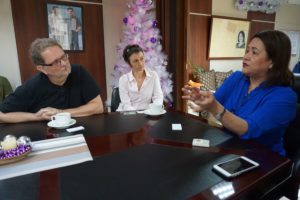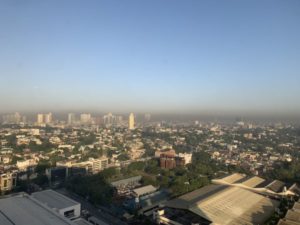
In the current and in upcoming newsletters we would like to introduce the research projects of the Director of the German Development Institute / Deutsches Institut für Entwicklungspolitik (DIE) Anna-Katharina Hornidge. As the first project in this series, we introduce “Clean Air for a Sustainable Future: A Transdisciplinary Approach to Mitigate Emissions of Black Carbon in Metro Manila, Philippines (TAME-BC)”, a project funded by the funding line “Sustainable development for urban regions” of the Federal Ministry of Education and Research (BMBF).
The project investigates the main sources of emissions that pose a threat to human health in Metro Manila, Philippines. The overall goal of the research project is to develop concepts of transformative policies allowing for institutional and technological innovations to improve air quality. Since July 2019, this project has been implemented together with the Leibniz Institute for Tropospheric Research (Tropos), the Leibniz Institute for Environmental Medicine (IUF) and various partners in the Philippines, including several universities, non-governmental organizations as well as civil society groups.
In 2015, the Tropos initiated a pre-study identifying exceptional high levels of Black Carbon (BC) in Metro Manila. Black Carbon is formed through the incomplete combustion of fossil fuels, e.g. in diesel engines, but also through burning wood. It is a component of aerosols or fine particulate matter called PM2.5 (particles with a diameter of 2.5 micrometer or smaller). Several studies indicate that black carbon is among the most relevant particulate matter to human health (IAAS 2017).
Based on these results, a research interest evolved around the societal-based causes of high emission levels, their impacts to human health, the institutional frameworks of air quality management and the potentials for transformative policies taking sustainability standards into consideration.

The pre-study conducted in 2015 identified the transport sector as a major contributor to high BC emission levels. Within the transport sector, this was further narrowed down to jeepneys, unique private vehicles serving as public transport vehicles, equipped with old second hand engines. In the current definition phase of the project, Tropos measured stationary emissions in two locations: in Quezon City and at the North Port of Metro Manila. In Quezon City, the city government is committed to the project while this is also the part of Metro Manila where most partner institutes are located. The IUF conducted lung function tests with jeepney drivers of two different driver associations to identify impacts of emission levels on their health status. Additional to the stationary measurements, mobile backpack measurements were conducted within jeepneys of the two mentioned jeepney driver associations.

Our working package of the current phase empirically assesses the institutional landscape, the rules, norms and values constituting the current air quality situation. From a de jure lens, this is mainly based on the Philippines Clean Air Act (CAA) from 1999, but also on the more recent Public Utility Modernization Program (PUVMP). While the CAA focuses on emission control measures, the PUVMP aims to replace old public utility vehicles with new buses equipped with at least Euro IV standard engines or else with electric powered engines. During a first field stay in February and March 2020 interviews with jeepney drivers were conducted to gain insights into local perspectives on air quality as well as on regulations on air quality planned by the government. Findings suggest a resistance towards the modernisation endeavours as rolled out by the Duterte administration. Even though there is consent on a need to improve air quality among the jeepney drivers, the proposed programme is regarded as anti-poor and as little participative. As the qualitative, guideline-based interviews were conducted on the moving jeepneys during operation hours, participative observation was used as an additional method to gather insights. The focus remained on the institutional landscape of air quality management in the Philippines and how they unfold on the local level, how they are changed and translated to fit the local context. The first results and the strengthened partner networks are the basis for the design of the main phase of the proposal.
Back from the field, the main tasks will be the analysis of the data and, based on this, to elaborate a joint proposal for the main phase. The current phase runs until 31 December 2020 and will, provided a positive evaluation of the proposal, continue on 1 January 2021. Since 1 April 2020, the project, together with the project staff Yvonne Kunz, have been officially located at the German Development Institute / Deutsches Institut für Entwicklungspolitik (DIE).

Schreibe einen Kommentar